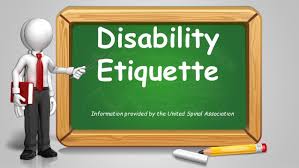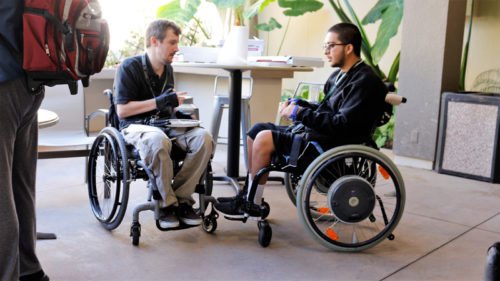Spinal Network offers Disability Etiquette training to companies and organizations. The fee for this training is based on the location of the training and the number of attendees. Each training session is approximately 1.5 – 2 hours in length. Our training sessions are interactive allowing for questions and dialogue for better understanding of the content.
Our Disability Etiquette training will discuss the following:
- the various types of disabilities
- terminology
- equipment sometimes used
- raise awareness
- dispel myths.
We are often asked why a company or organization should practice disability etiquette. When disability etiquette is used, everyone feels more comfortable and interacts more effectively. This creates a more productive work environment.
If your interested in Disability Etiquette training click the button below to send an email.
When you get hurt and suffer a Spinal Cord Injury, you suddenly find yourself in a new world where it feels like you have no control over anything. You’ve joined a “club” you may have known about, but never expected to be a member of. All manner of thoughts and feelings may be taking turns occupying your brain. Some form of depression is a very normal reaction at some point in the adjustment process. Some people, amazingly, avoid it completely. “It is what it is, I have no choice but to move on, no point in allowing myself to dwell on it, get depressed, etc.” Not many escape some level of sadness, however, but acknowledging it is difficult. Your body has just changed in ways you never dreamed of, so the last thing you want to think is that your mind is messed up too. If depression sets in, don’t ignore it, don’t withdraw, do something to change it.
Typical symptoms of depression include feeling sad, low energy, trouble sleeping, weight loss or gain, suicidal thoughts, loss of interest, moodiness, and loss of concentration. People are amazingly resilient and usually the depression lifts. There are ways to accelerate the process of adjustment:
- Put one foot (wheel!) in front of the other and force yourself to do the things that you know usually are enjoyable.
- Talk with someone outside your usual circle (we often don’t want to burden family or close friends) with whom you can safely say, “This is really hard!”
- Get with other folks with SCI in a support group or socially.
- Get out of the house and socialize, exercise, get into disabled sports, make plans to get back in school or take some classes in something you were always interested in but never got around to.
- Start thinking about what employment would look like.
If you’ve had depression in the past, you may have a blueprint for how you dealt with it, although now it is likely a much more difficult and challenging circumstance than any you have encountered.
If the symptoms continue to be severe – if nothing makes sense, nothing seems worth it, you are not doing the things you can do to move on (mastering self-care, advocating for yourself, getting out in the community, enjoying friends or family) it may be time to talk to someone – a counselor or therapist, clergy, or maybe a peer support person you met in Rehab. If you are having suicidal thoughts it’s definitely time. (Crisis Line 888-724-7240). As much as we feel pressured to be stoic and stay strong, we all have a limit on how much we should go it alone.
Richard Green, LCSW Sharp Rehabilitation Hospital, San Diego
December 20, 2019
CRT Stakeholders and Friends,
We have something extra to be grateful for this Holiday season! Tonight the President signed into law H.R. 1865 that includes permanent protections for Complex Rehab Manual Wheelchairs and their accessories/components. This is a great win in our collective advocacy to protect access to Complex Rehab Technology (CRT).
The included CRT provisions will permanently exempt Complex Rehab Manual Wheelchair bases from the Medicare Competitive Bidding Program (CBP). Additionally, there is an 18-month suspension in the current application of CBP payment rates to Complex Rehab Manual Wheelchair accessories. The suspension is effective January 1, 2020 to June 30, 2021 which will allow for further discussions to achieve a permanent resolution.
Our sincere thanks to our CRT champions Representatives John Larson (D-CT) and Lee Zeldin (R-NY) and Senators Bob Casey (D-PA) and Rob Portman (R-OH) for their leadership and hard work. We’re also grateful to Energy & Commerce Committee Chair Frank Pallone (D-NJ) and Ranking Member Greg Walden (R-OR), Ways & Means Committee Chair Richie Neal (D-MA) and Ranking Member Kevin Brady (R-TX), and Senate Finance Committee Chair Chuck Grassley (R-IA) and Ranking Member Ron Wyden (D-OR).
This shows when the CRT Community comes together things can get done! Recognition and thanks to the ITEM Coalition, United Spinal Association, NCIL, National Multiple Sclerosis Society, Christopher and Dana Reeve Foundation, Paralyzed Veterans of America, Spina Bifida Association, Clinician Task Force, RESNA, Abilities Expo, APTA, AOTA, and all the other consumer, disability, and medical professional organizations who invested their time in educating and advocating. Thanks also to our NCART members, dedicated consumer advocates, and to our industry partners AA Homecare, NRRTS, US Rehab, and the state associations for their significant contributions.
In summary, thanks to everyone who has played a part. It wasn’t quick and it wasn’t easy, but everyone’s outreach and persistence paid off. We hope you are able to enjoy the Holiday break and look forward to building on this win as we continue the work to protect access for people with disabilities who depend on CRT.
Regards,
Don ClaybackExecutive Director | NCARTdclayback@ncart.us | www.ncart.us
Our Peer Mentor program is off to a great start with thirteen trained and certified peer mentors. Lindsey Elliott, peer mentor trainer with the United Spinal Association, came out to San Diego to facilitate the full day training. The feedback we received was 100% positive and it was great to see so many people completely engaged.
I want to thank the Student Ability Success Center at San Diego State University for hosting our event. They were so accommodating throughout the planning process and the day of. Thanks also to Which Wich for the great sandwiches and box lunch.
We are making plans for a great Peer Mentor section on our website, one where you will be able to meet our peer mentors and watch an introductory video from each. If you are have need for peer mentor services, please click the button below..
This year’s NDEAM theme is The Right Talent, Right Now, which underscores the essential role that workers with disabilities play in America’s economic success, especially in an era when historically low unemployment and global competition are creating a high demand for skilled talent.
“Every day, individuals with disabilities add significant value and talent to our workforce and economy,” said U.S. Secretary of Labor Alexander Acosta. “Individuals with disabilities offer employers diverse perspectives on how to tackle challenges and achieve success. Individuals with disabilities have the right talent, right now.”
I feel that one of the most intimidating factors for a potential employer and one of the most confusing aspects of the job interview for both parties is reasonable accommodation. The employer might be thinking, “what is this going to cost, will it create a financial hardship?” The interviewee may not know how to broach the subject or when during the interview process this should take place. My own personal thoughts regarding this and again this is just my thoughts, you should have put a good amount f time thinking about this, what do you really need in a workplace to do the job. This is not always just about the physical layout, you have to think about things like start time, restroom breaks and the fact that it will probably take longer than your able bodied counterpart.
If you go to this page you will find a few valuable resources to get you started on your journey and remember we are just a call/email away should you need help or support. https://spinal-network.org/employment-preparedness/
- « Previous
- 1
- 2





